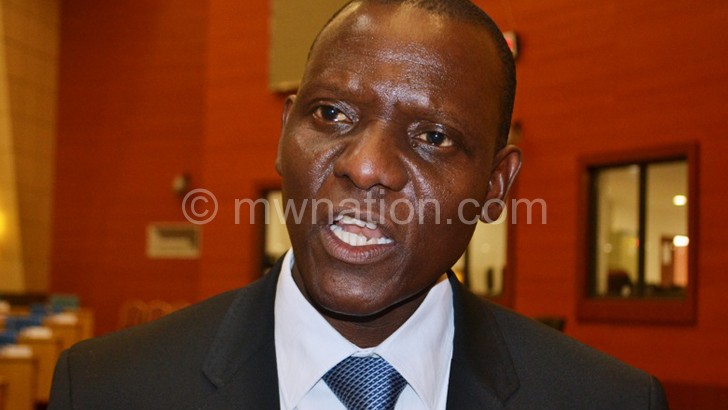Only K2.3m collected in Malata, Cement subsidy
Despite the Decent and Affordable Housing Subsidy Programme (DAHSP) entering its third year, chaos characterise its operations as there is no clear mechanism for recovery of government money, Nation on Sunday has established.
The programme, popularly known as Malata and Cement Subsidy, has only recovered K2.3 million of the K14 billion disbursed, representing 0.1 percent.

This raises fear that the programme, whose aim was to help the poor own decent houses, might fall into the same trap of non-payment that lost Mardef, Yedef, Sedom and Demat billions of taxpayers’ money.
Ministry of Lands has since admitted challenges in recovering the money, but said they are working on them. So far, out of the approved budget of K29.4 billion, DAHSP has accessed K14.128 billion with K2.3 billion of the budgeted K7 billion being accessed in 2014/15 financial year whereas K4.3 billion out of K7 billion was spent in 2015/16 budget.
The programme also accessed K6 billion out of K8.4 billion in the 2016/17 fiscal year and has so far utilised K1.5 billion of the budgeted K7 billion in 2017/18 fiscal year, but little has been recovered.
The clear lack of repayment mechanisms is even evident in cases where some beneficiaries have expressed willingness to repay the money, but do not know who to contact and where to deposit it.
In Mombezi Ward in Chiradzulu, for instance, Aubrey Chipojola, one of the beneficiaries from Chikagwire Village in group village head Kumitete, said he has his money, ready to pay back, but does not know how to go about it.

the ministry
“We are still waiting for the repayment forms. The committees are yet to be trained how they are going to collect the money and how they are going to remit it to government,” observed another beneficiary.
Director of works in Nkhata Bay, Isaac Mdindo, said the beneficiaries he has visited in the district indicated willingness to pay back the money.
“We are waiting to give them repayment forms. Currently, we are distributing materials and when we finish, we will then distribute the forms, when they are ready,” he said.
Ministry of Lands spokesperson Charles Vintulla told Nation on Sunday that recoveries of the loans have started, but the process has been slow.
He highlighted the challenges of printing of loan repayment books and other documentation for all housing development groups across the country.
“Another setback has been the remittance and receptive ability by local banks to accept the deposits on behalf of the programme,” said Vintulla.
He disclosed that K2.3 million was collected in Salima and that K4.5 million was collected in Blantyre City, but the funds are with the HDGS, awaiting repayment modalities.
“Moreover, the repayment period is five years and it is expected that within this period, most bottlenecks to loan repayment will have been ironed out. Plans are underway to construct more houses in 2017/18 under the grant component, funds permitting,” said Vintulla.
DPP, in 2014, criss-crossed the country promising Malawians that once in government, the party will implement the DAHSP to meet the housing needs of the people, especially the poor.
In the DPP manifesto, the party promised to implement policy for housing that will focus on subsidising prices of iron sheets and cement for poor people to build their own houses.
“Low-income households will manage to build and own decent houses through subsidised cement, iron-sheets and other construction materials under the DAHSP concept,” reads the manifesto.
But as of today, just a third of those targeted under loan schemes have homes while only 1.2 percent of those earmarked to have free houses have benefited.
DPP spokesperson Francis Kasaila said the DAHSP was not a party programme but a government one.
“Our understanding is that it is being run by a committee at traditional authority level elected by the people of the area. As DPP, we cannot get politics into government programmes. If you want any update on the programme, talk to the ministry responsible or Ministry of Information,” said Kasaila.
On poor funding to the programme, against the approved amount, Ministry of Finance spokesperson Davis Sado told Nation on Sunday that the programme remains one of the focal policy issues of government.
“Whenever resources are available Treasury has always provided and will continue to support,” he said.
Sado explained that a budget was formulated in anticipation that resources will flow as planned.
“When there are fluctuations in the flow of resources or when resources are thin, the Ministry of Finance has to equitably distribute the available resources to finance existing programmes and also fund MDAs [ministries, departments and agencies] for other recurrent expenditures,” Sado said.






This is why most white people around the world believe that black people are still Anyani wanthu and not full developed human beings.
How on earth can a sensible govt start disbursing billions of Kwachas without a mechanism or a strategy in place to collect that money back?
Can you imagine how much worthy companies up and down the country would have made if that Malata subsidy money was use to build a power plant to reduce or eliminate blackouts in out country?
Politics of appeasement in Malawi should stop for our country to develop…..
APM out Chakwera in ……..Ndatha Ine Yanu Mbonga